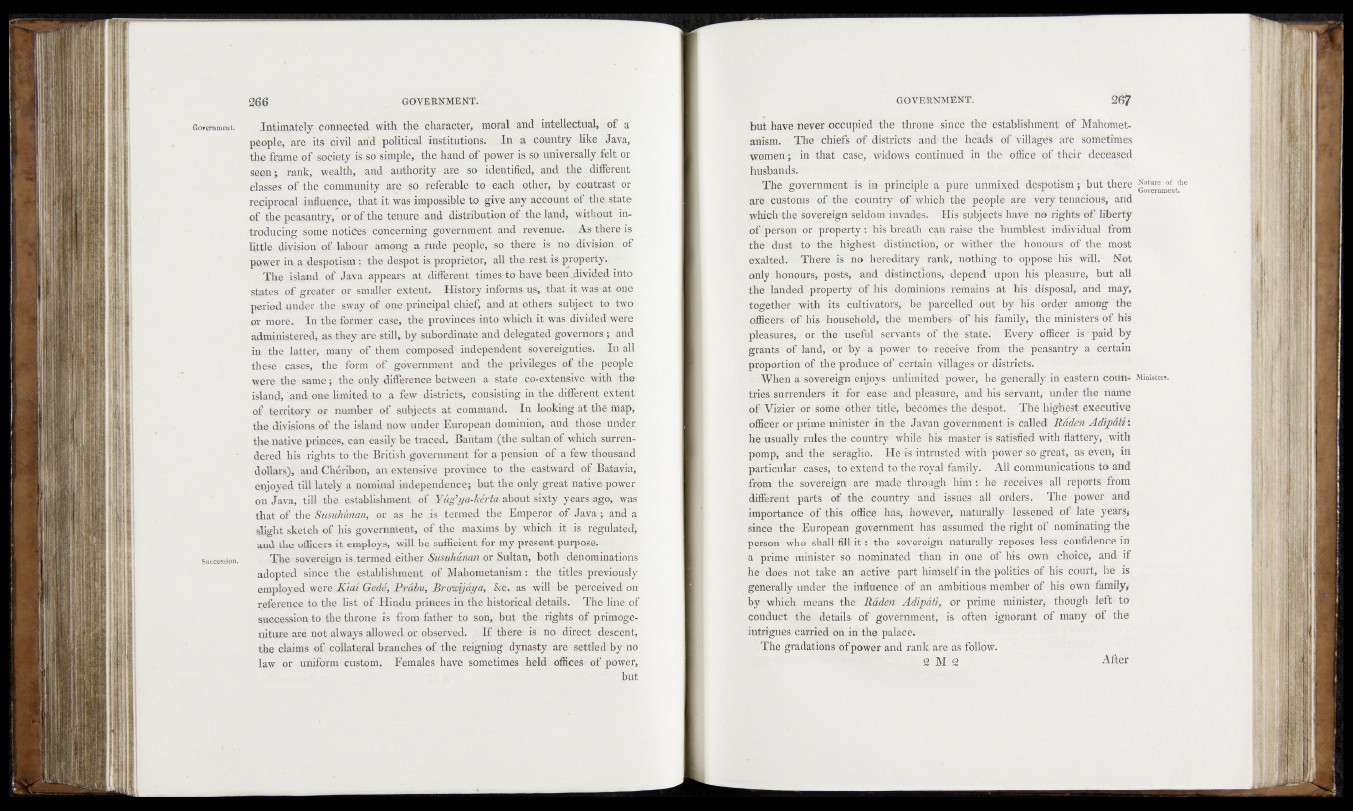
Government.
Succession.
Intimately connected with the character, moral and intellectual, of a
people, are its civil and political institutions. In a country like Java,
the ffonvft of society is so simple, the hand of power is so universallyifelt or
seejj . rank, wealth, and authority are so identified, and the different
classes of the community are. so referable to each other, hy contrast or
reciprocal influence, that it was impossible to give any account of tip slate
of the peasantry, or of the tenure and distribution of the land, without introducing
some notides concerning government and revenue. As there is
ljttle division of labour among a rude people, so the*© is no division of
power inra despotism: the despot is proprietor, all the.rest is property.
The- island of Java appears at. different times to have beenvdivided into
states, of greater or smaller extent. History informs us, that It was-at one
period under the sway of one principal chief, and at others subject to two
or more. In the former ease, the. provinces into which it was divided were
administered, as they are still, by subordinate and delegated governors j and
ip the. tetter, many of them composed independent sovereignties. In all
these cases, the form of government and the privileges of the people
Were the same I the only difference between a state co-exteaswe with the
island, and on©' limited to a few districts,, consisting in the different extent
of territory or number of subjects at command, dn looking at the map,
tfee divisions of the island now under European dominion* and thwechMler
the native priitces,. cm easily be traced. Bantam « (ft e sultans of which surrendered
his rights to the British, government for a pension of a few thousand
dollars), andChéribon, an extensive provinee -to the eastward *01 Batavia,
enjoyed till lately a nominal »dependences hut the pnly great native power
on Java, till the establishment of Yug’ya-kérta about sixty years ago, was
that óf the SusuMnan, ,m as he is termed the Emperor of Java ^ and a
slight sketch- of his government, of .the maxims by whicte it ia regubted,
and the officers it employs, will he sufficient for my present: purpose.
The sovereign isjermed either Skmhtinonor Sultan, both denominations
adopted since the establishment, of Mahometanism: the titles: previously
employed were Kifli Qedè, Prdbu, j&ro’wgaya, &c. as will be perceived on
reference to the list of Hindu: princes in the bistoricali details. . Whe line aif
succession to .the. throne is from father to son, bat the rights of primoge-
qituije are not always allowed or observed. If there is; noi direct descent,
the claims of collateral branches of the reigning dynasty are settled: by no
law or uniform custom. Females have sometimes held offices: of power,
hut
but have never occupied the throne since the establishment of Mahometanism.
The chiefs of districts -and the; heads of villages are sometimes
women; in that ease, widows continued in the office of their deceased
husbands.
The government is in principle a pure unmixed despotism j but there ^ ^ rT,°/n,the
are customs of the country of which the people are very tenacious, and
which-the sovereign seldom invades. His subjects have no rights of liberty
of person or propertyrhis h'reath can raise the humblest individual from
the dust to the highest distinction, or wither the- honours of the most
exalted. There is no hereditary rank, nothing to oppose his will. Not
only honours, posts* and; distinctions, depend upon his pleasure, but all
the landed property of his doftiinions remains at his disposal, and may,
together with its cultivators, be parcelled out by- his Order among the
officers of his household, the members of bis family, the ministers of Ms
pleasures, or the useful' servants' of the statê. JÉvefy officer iS.vpaM by
grants: of land, or' by a power tOireeeive froifi thë peasantry a certain
proportion of the produce of certain Villages o# districts.
• .When a sovereign enjoys unlimited power, he gènwaUyritt eastern conn* Minister»,
tries surrenders it for ease and pleasure, and1 his servants under the name
of: Vizier or some other title, becomes the despot. The highest executive
officer or prime minister in the Javan government is called M&den AdipSHi
he usually rules the country while his master is satisfied with flattery, .with
pomp, arrd the seraglio.. He is intrusted with powefso great, as eVen^ in
particular caseis, to extend to the royal family. All communications tó* and
from the sovereign are made through I him he röceivé^ all reports ftom
different parts of the country and: issues ail orders. The power- afld
importance of this office ha% however, naturally lesSeöêd o#? late yéaVsf
since the European government has assumed the right of nominating the
person who shall fill i t : the sovereign naturally-repóses' less confidence in
a prime minister So nominated than in one of las own fchöïcêj and if
he does not take an active part himself in the polities- ofibis Court^ he is
generally under the influence of an ambitious metnher of hisown family,
by which mem* the- Maden- Adipati, @f prime miniver, fhóögh. left- té»
conduct the ■ details of government, iS'-mfte®’ ignorant óf many df the
intrigues carried on in the palace.
• The gradations of power and rank are as follow.
. Ü M f ' After